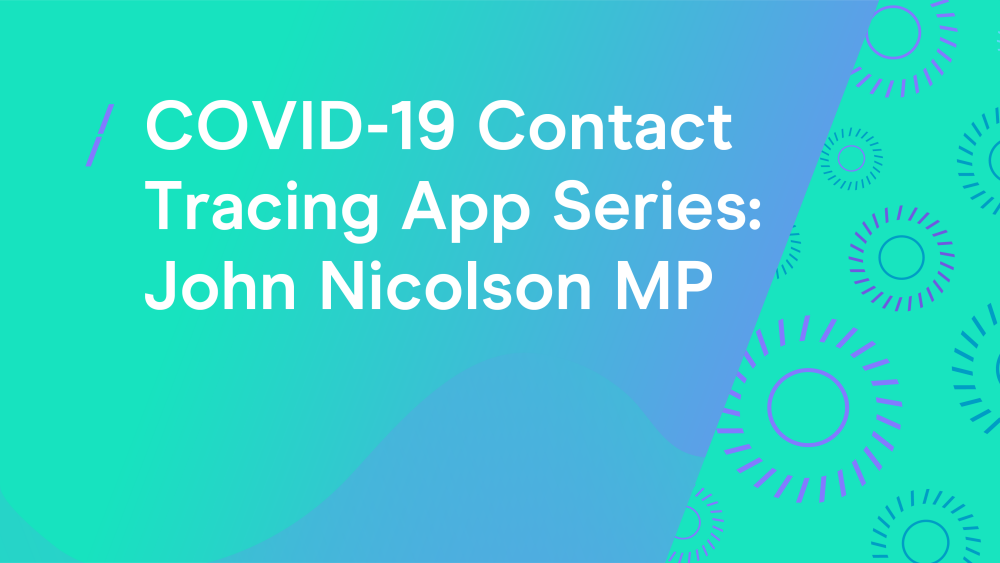COVID-19 Contact Tracing App Series: John Nicolson MP
26 Jun 2020

John Nicolson MP
SNP Shadow Secretary of State for Digital, Culture, Media & Sport
"While tech can help us immeasurably, we can’t let it become a hurdle, especially when we are still working out the knots of privacy and other ethical concerns."
‘World-beating’. That’s how Boris Johnson described the contact tracing app he promised he’d introduce. The Health Secretary for England, Matt Hancock, claimed it would be an ‘incredibly important part’ of our fight against coronavirus. But grandiose rhetoric soon hit reality. As I write, the independent, UK Government ‘world-beating app’ is unable to detect 96% of iPhones and a quarter of Androids. And failure hasn’t come cheap, with millions of pounds of taxpayer money wasted.
Perhaps we shouldn’t be surprised. Boris Johnson put the development of the app into the hands of Tory House of Lords appointee Baroness Harding of Winscombe - the chief executive of TalkTalk who presided over one of the largest data breaches in history.
The Health Secretary’s mid-May deadline for the technology to be up and running came and went without a trace of a tracing app. As did the Prime Minister’s less ambitious target of 1 June. Swift to shift the blame, Matt Hancock turned on Apple and Google, both of which dismissed the notion that the Government had ever been in contact with them regarding alternative app technology.
Exclamations of ‘world-beating’ are but distant echoes now. And the UK Government’s incompetence and opaqueness on this and many other matters throughout this crisis have sadly earned it the position of leader in one area alone: tragically the largest death toll in Europe.
The UK Government’s hapless, app-less ‘Test and Trace’ strategy is failing to reach two-thirds of those with COVID-19. But the intersections of technology and this pandemic go far beyond contact tracing apps.
So, what role can technology play to close the gap and ensure a swift and safe recovery plan? Tackling the scourge of coronavirus disinformation is one crucial area where technology can play a significant part in preventing the spread of the virus.
As we begin to emerge from lockdown, businesses like shops and restaurants in Scotland are being encouraged to put in place new processes to equip us to deal with further outbreaks. Businesses are being asked to store data—such as customers’ names and addresses, and dates and times of visits—for up to four weeks. This will inevitably add another layer of administration to business practice and raises questions on data privacy. Technology can surely offer a contactless solution for this laborious task that both minimises interactions with (and therefore risk to) staff and ensures adherence to data privacy best practice.
Other simpler technological solutions can help our emergence from lockdown too. Many councils monitor traffic flow and congestion in their towns. There is no reason why simple, temporary solutions aren’t used to monitor how crowded our parks and beaches have become, for example. This would help us plan where to enjoy our time in the sun, however rare it might be in Scotland. Simple reporting of traffic and footfall data to a central website could give key insights without the use of personal data.
While tech can help us immeasurably, we can’t let it become a hurdle, especially when we are still working out the knots of privacy and other ethical concerns. Simpler technological solutions exist and already work, and we should focus on using what we know well rather than wasting time and public money on what we do not.
Click to read more expert contributions to the series.
John Nicolson is the Member of Parliament for Ochil and South Perthshire. Educated at Glasgow University and Harvard, he is a journalist and broadcaster by profession. He was a reporter on ‘Newsnight’, the presenter of BBC ‘Breakfast, and has been a radio anchor at both LBC, Radio Scotland and Talk Radio. John is the first in his family to go to university, and graduated from the University of Glasgow before going on to Harvard on a scholarship. He lived in the USA for a number of years and was a speechwriter in the United States before returning home to begin work at the BBC.

Please login to comment.
Comments